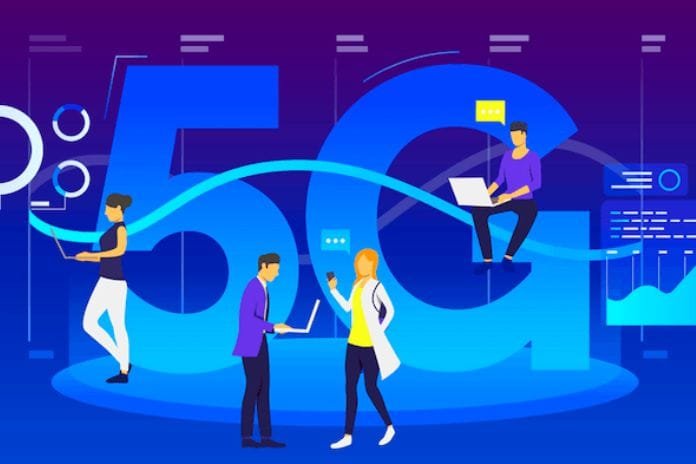
5G networks are the new generation of mobile internet connection; it combines cutting-edge networking technologies to deliver faster speeds and connections for devices such as smartphones, computers, etc.
With 5G, data transmitted over wireless bandwidth connections can reach up to 20 Gbps with a latency of 1 millisecond or less. This is possible as 5G signals are transmitted through many cell stations in places such as building roofs. Cell stations are necessary for the propagation of the millimeter-wave spectrum – which is what guarantees high speeds for 5G – as it only travels short distances.
How Does 5G Affect The Context Of The Digital Age?
5G networks enable the creation of an intelligent ecosystem that can communicate instantly in multiplatform environments, enabling the development of technologies with new communication interfaces, which can use elements such as voice commands or gestures to promote real-time interaction between users and the connected objects around them.
In addition, the 5G network offers a wide range of possibilities in terms of communication and mobility since high speeds allow, for example, to stabilize video calls, allowing people to communicate even when they are in very distant locations. This would immensely facilitate activities like distance learning or remote work anywhere in the world.
The 5G network will also foster the new digital age market, opening space for creating new business segments that fit into the model of an increasingly connected society, which demands new products and technologies all the time. In addition to telecommunications and high technology, areas such as healthcare and transport will be impacted by the market change promoted by 5G. 5G technology will make room for the democratization of access to services such as education and health, as well as enabling greater agility and less bureaucracy for the provision of services.
How Can 5G Be Applied?
Supply Chain
In addition to technologies such as Blockchain, the supply chain and supply chain can benefit significantly from the facilities of 5G technology. The high speeds and instantaneous transmission of data promoted by this network allow tracking products along the chain through sensors that provide more complete and real-time information, helping avoid losses and reduce costs and waste.
Autonomous Vehicles
5G will enable the creation of autonomous vehicles that communicate with each other and traffic signs and other equipment on the road and share information about road conditions, and performance information, among many other data. Some of them can, for example, avoid collisions and other traffic accidents; this is because the vehicles will be intelligent and be able to preemptively learn immediately about how they should act and how other nearby vehicles act in these situations.
Public Infrastructure
5G technology will enable cities to become more innovative by operating more efficiently. With the speed of data exchanges on the 5G network, intelligent sensors can be installed by utilities that can monitor possible problems in the public infrastructure, which will be notified to public works departments to be studied and corrected.
Health Area
Telemedicine, remote surgery, and physiotherapy through Augmented Reality, among many other innovations of this caliber, will be possible thanks to 5G. More effective and real-time monitoring of patients will also be a reality through sensors that will use the high speed and low latency of the 5G network to transmit information about patients to doctors and nurses.
IoT
One of the areas that the 5G revolution will most impact is the Internet of Things. For IoT sensors to communicate with each other, generating a lot of data requires a lot of resources, especially storage space and data networks.
With 5G speeds and low latencies, the IoT will be able to adopt MTC (Massive Machine-Type Communications) devices that are intelligent and require much fewer resources since several sensors of this type connect to a single base station for data processing, making the exchange of information between sensors much more efficiently. Thus, 5G technology opens up space for massive adoption of IoT, which can transform all industrial and business segments, making them more efficient and agile and, in many cases, more sustainable with the use of IoT devices within the agricultural sector. , for example, which can promote water use reduction through intelligent IoT devices.
Marketing
One sector that will be heavily impacted by 5G, especially within the corporate context, is the marketing sector. That’s because connections with more incredible speed and stability will transform the ways of interacting with the media and reaching digital customers. The 5G network will enable the use of applications and activations that explore virtual reality and augmented reality, in addition to promoting a change in the focus of digital advertising, which will turn to mobile advertising.
What Does It Represent For Companies?
The new digital age already imposes the need for many changes in the organizational culture and work method of companies, and the arrival of 5G will demand increasingly technological adaptations on the part of organizations.
The more technology there is, the more digital consumers will become; therefore, with the 5G network, many services and products will cease to exist or will no longer live in the way they are today, thus being aware of the digital world constantly updating and innovating. It is the key to business survival.
In the context of the digital age, the data-driven economy, also called data-driven, tends to benefit significantly from 5G. This new technology makes it possible to collect, analyze and use almost instantly a massive amount of data, which will be essential for companies to adapt to data-driven and will provide powerful insights for developing products, services and even internal processes that seek the best digital customer experience.
Also Read: The Business Management Model With 5G
